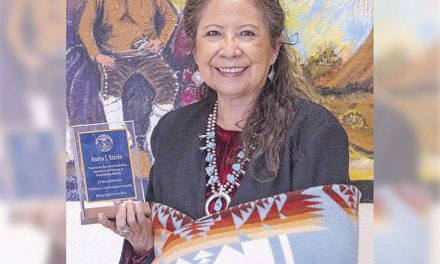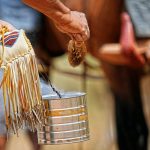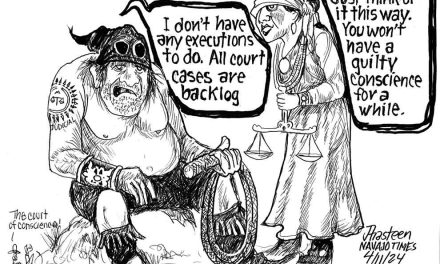
Businesses lose out due to deadline snafu
WINDOW ROCK
Numerous Navajo Nation businesses owners who were applying for the Division of Economic Development Business and Artisan Grant Relief Program last week said they were unsuccessful in submitting their application by the deadline, which was moved up from Nov. 20 to Nov. 18 at 12 noon with little warning.
Some applicants said they never got word that the deadline had been changed. “I was communicating with an agent who was informing me that I needed to provide additional information,” said a business owner who wanted to remain anonymous.
“I thought the grant was open to the end of the month, but they made the cut-off date to Nov. 20. When I got on to upload my documents on Nov. 18, the site had already been closed.”
Additionally, some applicants said that they had never received their required Business Regulatory certification number from DED, despite having applied for it weeks earlier, which prevented them from applying for the grant.
Others cited technical difficulties with the online application portal, including error messages, screens freezing and system time-outs. DED in August was allocated $54.5 million (legislation No. 144-20) in Navajo Coronavirus Aid, Relief and Economic Security Act funds to offer relief grants to businesses and artisans adversely impacted by the COVID-19 pandemic.
As a public service, the Navajo Times is making all coverage of the coronavirus pandemic fully available on its website. Please support the Times by subscribing.
How to protect yourself and others.
Why masks work. Which masks are best.
Resources for coronavirus assistance
Qualifying businesses that could demonstrate financial hardship due to the public health emergency were eligible for up to $60,000 in relief while eligible artisans could qualify for up to $5,000.
Audit firm Baker Tilly was hired by the controller’s office to help set up the application portal and administer the funds to approved applicants. “It is very unfortunate the Navajo business and artisan relief program was abruptly and prematurely closed before the November 20th deadline,” said Derrick Watchman, president of Sagebrush Hill Group. “And, to boot, no or late notice from the Nation.
“The Dineh Chamber is aware that many businesses who were trying to apply were basically shut out of vitally needed cash to carry their operations through the holidays and into the new year,” he said.
‘Unfortunate and troubling’
DED Division Director JT Willie said the application deadline change was announced on the DED Facebook page (on Nov. 17). In a comment on the DED post, an applicant asked, “Why was the date changed? You’ve been telling people that they had until November 20th?” DED replied, “…In further review with legal and Office of the Controller of the legislation that states all CARES funds related to this program will be reverted to the Hardship Assistance Program on November 20… we have to close out all agreements by realistically November 19 in preparation for the reverting of the funds…”
On Oct. 30, the Naabik’iyati’ Committee passed a directive that any unobligated CARES Act funds not spent by Nov. 20 would automatically be reallocated to Hardship Assistance Program Fund.
Originally, the DED grant deadline was Nov. 30. “The sudden closure of the business and artisan relief application only proves again that small businesses are invisible in the mind of our Navajo leaders,” said Dineh Chamber of Commerce Secretary/Treasurer Al Henderson. “This is unfortunate and troubling.”
Change Labs, a Navajo nonprofit dedicated to supporting Native American entrepreneurs, had provided assistance to hundreds of Navajo business owners with the DED grant application since early October, according to Executive Director Heather Fleming.
“Helping the Navajo business community apply for the grant is a huge undertaking,” Fleming said in an email expressing her concerns to the Chamber and Speaker Seth Damon. “Which is why we were frustrated and angered to learn that the November 20th deadline was cut short, without consultation or advance notice to the business community,” she said. “This act stripped away the opportunity for hundreds of business owners to get the financial support they direly need,” she said.
Fleming said many business owners had started their application weeks in advance but were unable to complete it due to the “lag in processing time by the Navajo Nation government.” “A huge percentage didn’t receive their business registration numbers even though they applied in October and early November, and so they couldn’t apply,” she said. “So, something was definitely wrong with this process. But shutting it down was not the solution.”
Additionally, Fleming said several applicants who submitted their grant application before the revised Nov. 18 deadline and were asked to submit additional information were unable to do so due to the premature closure of the portal.
“Our tribal government has shown its cards as far as its inefficiency and lack of communication,” said Dineh Chamber President Jeff Begay. “They really don’t have any concern for the private sector and what it can contribute to the Navajo Nation.” Begay said many small business owners are unable to support their families during this time.
“It’s really sad,” said Begay. “I think our tribal government does not understand economics. They don’t know how to make money. It’s the private sector that knows how to do that. The small business people have been left out. It’s very disappointing.”
Communication breakdowns
Willie said Navajo Nation “divisions were informed by controller (Pearline Kirk) and Baker Tilly to begin closing applications” on the 18th due to the reversion date of Nov. 20 because it takes two to three days to process the applications and grant offers had to be accepted by close of business on the 20th.
Meanwhile, a statement from the controller’s office on Wednesday indicated that the “issue of program deadline” was raised with Willie, but they never heard back from him.
“Staff from the controller’s office asked Willie what type of communication had been made in regards to grant acceptance and timing of the program closure…” said Controller Pearline Kirk. “Per guidance from the Navajo Department of Justice and concurred with the controller’s office, in order for funds to be obligated in this particular program by Nov. 20, the grant must be approved and accepted by the awardee as of that date.
“The average grant review and acceptance process takes anywhere from 3-10 days depending on how many times a grant is sent back to an applicant for not providing the correct information,” she said.
Communications breakdowns notwithstanding, Willie still stands by the success of the grant program, which, as of Nov. 24, had awarded $29.1 million to 4,372 applicants by the Nov. 20 deadline, as reported in a press announcement.
Of this amount, 1,117 Navajo businesses received a total of $13.1 million and 3,255 Navajo artisans received at total of $16 million.
‘An injustice’
Fleming said there was no public transparency as to why the decision was made to pull back the application deadline and who made it. “I think all of us share the sentiment that this was an injustice,” said Fleming.
“No one was given any notice and there was no communication as to why this happened.”
Fleming said that, unfortunately, the prevailing “sentiment” among the small business community is that the Navajo Nation government doesn’t work for them, but against them. “What they’ve done with this action is just fuel that thinking and that belief,” she said.
Finally, Fleming shared that several long-established businesses that were able to apply for the grant relief and had “very legitimate claims” didn’t qualify for assistance.
“From our perception, they were a shoo-in for the grant,” she said. “There’s no reason why they should have been denied. We’d love to understand how they chose who would get funding and who wouldn’t.”
Watchman said as the federal government transitions to a new administration, the Dineh Chamber is recommending that any future business relief funds be channeled directly to Navajo business owners instead of having to apply through the Navajo Nation government.
Meanwhile, with the grant relief balances now transferred to the Hardship Assistance Fund, Watchman encourages all Navajo businesses and their family members to apply for individual hardship payments by the Nov. 30 deadline. “It won’t be enough to carry business expenses, but sadly it’s all that’s available,” he said.







 Highway 264,
Highway 264, I-40, WB @ Winslow
I-40, WB @ Winslow